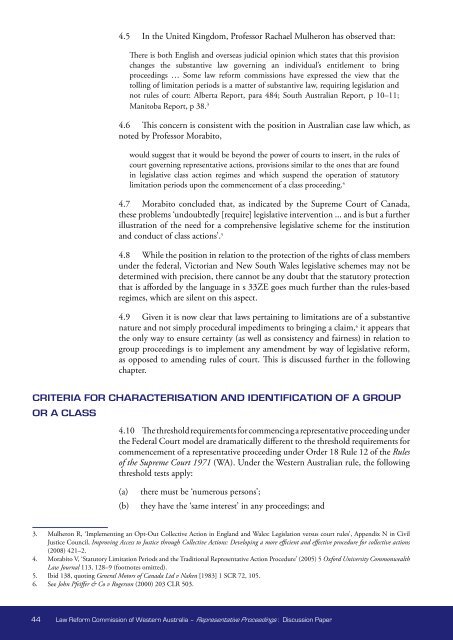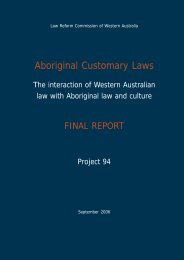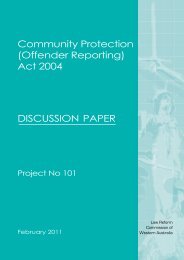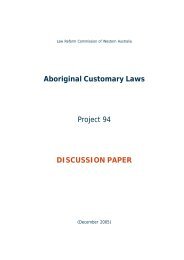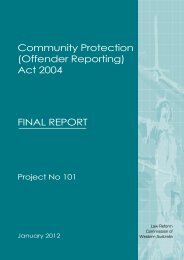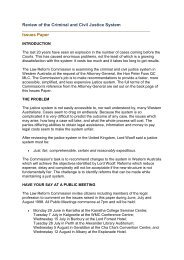Discussion Paper - Law Reform Commission of Western Australia
Discussion Paper - Law Reform Commission of Western Australia
Discussion Paper - Law Reform Commission of Western Australia
Create successful ePaper yourself
Turn your PDF publications into a flip-book with our unique Google optimized e-Paper software.
4.5<br />
In the United Kingdom, Pr<strong>of</strong>essor Rachael Mulheron has observed that:<br />
There is both English and overseas judicial opinion which states that this provision<br />
changes the substantive law governing an individual’s entitlement to bring<br />
proceedings … Some law reform commissions have expressed the view that the<br />
tolling <strong>of</strong> limitation periods is a matter <strong>of</strong> substantive law, requiring legislation and<br />
not rules <strong>of</strong> court: Alberta Report, para 484; South <strong>Australia</strong>n Report, p 10–11;<br />
Manitoba Report, p 38. 3<br />
4.6 This concern is consistent with the position in <strong>Australia</strong>n case law which, as<br />
noted by Pr<strong>of</strong>essor Morabito,<br />
would suggest that it would be beyond the power <strong>of</strong> courts to insert, in the rules <strong>of</strong><br />
court governing representative actions, provisions similar to the ones that are found<br />
in legislative class action regimes and which suspend the operation <strong>of</strong> statutory<br />
limitation periods upon the commencement <strong>of</strong> a class proceeding. 4<br />
4.7 Morabito concluded that, as indicated by the Supreme Court <strong>of</strong> Canada,<br />
these problems ‘undoubtedly [require] legislative intervention ... and is but a further<br />
illustration <strong>of</strong> the need for a comprehensive legislative scheme for the institution<br />
and conduct <strong>of</strong> class actions’. 5<br />
4.8 While the position in relation to the protection <strong>of</strong> the rights <strong>of</strong> class members<br />
under the federal, Victorian and New South Wales legislative schemes may not be<br />
determined with precision, there cannot be any doubt that the statutory protection<br />
that is afforded by the language in s 33ZE goes much further than the rules-based<br />
regimes, which are silent on this aspect.<br />
4.9 Given it is now clear that laws pertaining to limitations are <strong>of</strong> a substantive<br />
nature and not simply procedural impediments to bringing a claim, 6 it appears that<br />
the only way to ensure certainty (as well as consistency and fairness) in relation to<br />
group proceedings is to implement any amendment by way <strong>of</strong> legislative reform,<br />
as opposed to amending rules <strong>of</strong> court. This is discussed further in the following<br />
chapter.<br />
Criteria for characterisation and identification <strong>of</strong> a group<br />
or a class<br />
4.10 The threshold requirements for commencing a representative proceeding under<br />
the Federal Court model are dramatically different to the threshold requirements for<br />
commencement <strong>of</strong> a representative proceeding under Order 18 Rule 12 <strong>of</strong> the Rules<br />
<strong>of</strong> the Supreme Court 1971 (WA). Under the <strong>Western</strong> <strong>Australia</strong>n rule, the following<br />
threshold tests apply:<br />
(a)<br />
(b)<br />
there must be ‘numerous persons’;<br />
they have the ‘same interest’ in any proceedings; and<br />
3. Mulheron R, ‘Implementing an Opt-Out Collective Action in England and Wales: Legislation versus court rules’, Appendix N in Civil<br />
Justice Council, Improving Access to Justice through Collective Actions: Developing a more efficient and effective procedure for collective actions<br />
(2008) 421–2.<br />
4. Morabito V, ‘Statutory Limitation Periods and the Traditional Representative Action Procedure’ (2005) 5 Oxford University Commonwealth<br />
<strong>Law</strong> Journal 113, 128–9 (footnotes omitted).<br />
5. Ibid 138, quoting General Motors <strong>of</strong> Canada Ltd v Naken [1983] 1 SCR 72, 105.<br />
6. See John Pfeiffer & Co v Rogerson (2000) 203 CLR 503.<br />
44 <strong>Law</strong> <strong>Reform</strong> <strong>Commission</strong> <strong>of</strong> <strong>Western</strong> <strong>Australia</strong> – Representative Proceedings : <strong>Discussion</strong> <strong>Paper</strong>


